Please browse the website for testimonials and other schools blogging successfully as a result of this course....
Following interest from more schools, we are holding another one day hands-on Blogging course on 23rd October for forward thinking schools in the North East!
Please browse the website for testimonials and other schools blogging successfully as a result of this course....
4 Comments
As with the previous course, I am proud to say that the 'Creating a Blogging Class' course on 23rd May has been rated as 5/5 by all participants for 'Course Delivery' and 'Course Content'! Here are some of the testimonials from the course: "Very practical course that included plenty of time to trial and experiment with the apps and blog site. I achieved a lot in the day." (Ruth) If you are interested in what the course involves, I've added some of the slides from the day. A date is to be added in September so watch this space ...... Wow! A month has passed since 8 teachers came to Tanfield Lea Primary School for a course to set up new class blogs.
I must admit I've been particularly busy and not managed to blog as much (either with the class or personally) as I would like. What a pleasure, then, when I looked at what the participants had got up to with their blogs over the period! Most of the participants have established blogs, with some rolling out other class blogs. As one head said to me, all the other teachers had asked when they could get one, so the whole school was up and running within days! Below are links to show what you can do with some great ideas, and a little know-how:
I might have guessed though, given what a dedicated bunch they were! We hope to run another course in September, so keep watching this space.... Spaces are starting to fill for the Blogging Course on May 23rd!
We hope you can make it; it will change your pupils' attitude to writing and audience! Exciting news! We have a date for a new blogging course: May 23rd at Tanfield Lea Primary.
It's the last working day of the half-term for most; why not spend the day creating a working class blog, which can transform the standard of pupils' work by providing them with an international audience for their efforts? No technical expertise required; just some imagination from committed teachers about how to inspire your pupils! For more on the benefits of blogging, click here. For testimonials from the previous course click here, or browse some of the blogs created on our workshops. We hope you can join us..... Having previously written about blogging in Foundation Stage and Key Stage 1, it seemed obvious to continue to the series by looking at what Years 3 and 4 might be able to do. In addition to what younger children can do, here are the increasingly advanced skills that a 7 - 9 year old could use in school:
1. Creating your own posts During some inset with David Mitchell, uberguru of blogging, our year 4s used their own logins to create blog posts at this site: http://brandontanfield.asksir.co.uk/ As a result, this led us to explore giving the children their own logins to add content. We did this by using email accounts linked to each ipad rather than individual children (this saved me lots of work!). It also meant each child can create blog posts on the class blog without the need for logging in and out with long emails. This allows lots of digital content (including posters made on Pic Collage etc.) to be shared without the teacher having the time consuming job of posting work. It also can be used to teach children skills like tagging their work, to create a digital portfolio. As older children are more likely to create content with less teacher support using apps such as iMovie, Show Me, Audioboo etc. (and will want to share it), childrens' logins can free up the valuable time of the teacher. 2. Using the blog for homework As well as using the blog to share games with children, blogging activities such as 100wc.net are accessible to Year 3 and 4 pupils. This allows children to develop their writing skills, and where combined with children creating blog posts, encourages comments from children and adults around the world, generating a ready-made global audience. I'm sure there are lots more uses for lower KS2 children; as always it's the Year 3 / 4 teachers who come up with age-appropriate innovative ideas! I previously wrote about Blogging in the Foundation Stage.
In addition to those ideas, Key Stage 1 children are increasingly able to produce content on iPads, often using an iPad set up by the teacher. Thus, the child creates the content, which is then uploaded by the teacher. 1. Show Mes This fantastic iPad app allows children to create short podcasts about a subject. Here is a Year 1 who did a recording of something she had learnt in class. Note, also the parental comments, which I have mentioned previously. Audioboo can be used in a similar way, requiring a teacher controlled login. 2. Puppet Pals This app allows children to make cartoons. It involves scripting, practising and performing. Here is a snippet of a Year 1 puppet pal! 3. Using the Weebly app Another way of getting children to contribute to the blog is by giving them an iPad with the Weebly app loaded and getting them to type about what they have been learning. Here a Year 2 child leaves a simple comment about what he has been learning. All of the ideas above develop the idea of children creating blog content, without children needing cumbersome logins. Ultimately, the children get the thrill of an audience seeing and commenting their digital work, which is one of the key benefits of class blogs! Following our staff meeting tonight, where the staff discussed different apps which could be used from Early Years to Year 6, I think this is a good opportunity to promote a fantastic resource made by a colleague, @MattPEducation.
Recognising the mutually beneficial relationship between blogging and iPads, within his Year 5 blog he has been cataloguing his use of iPads in the classroom. It really is an ever-growing list, which should be a must-read for those new to iPads and blogging: Using iPads in Education Another great iPad resource which Matt references is (another) Mr P's ICT site! Blogs in our school began in upper KS2 and many class blogs thrive with this age group. The children are digital natives, have regular ICT sessions and enjoy the buzz that a global audience brings. Nevertheless, since our school rolled out blogs to the whole school, the Foundation Stage blog has been the one to watch to judge how 'low you can go' with blogs. In fact, in our school, the Foundation Stage have led the way in developing parental involvement, which I wrote about in my last post. From looking at our FS blog, here are some of the great uses of a Foundation Stage blog!
1. Sharing Successes Foundation Stage are brilliant at fostering links with parents. This natural link between school and parents begins with handing the children over every morning, but can be fostered by sharing sessions where parents find out about the work of the Foundation Stage unit. A class blog is the natural extension of this, because at this age parents are arguably most actively involved in their child's development. 2. Parental involvement in the blog Besides the reader stats for a blog, 1 measure of involvement is the number of comments. As mentioned previously, our FS team set 'homework' for parents to look at the blogs with their children, encouraging comments where possible. Here are some examples of parental involvement (Comments by parents, comments by children), which demonstrate the strengthening of home-school links. 3. Encourages a whole school ethos If staff and children from other year groups leave comments on FS blogs (as they do), this emphasises the positive whole school ethos and boost to self-esteem for both commenter and the children who receive the comments. Here is just one example 4. Adding useful weblinks If you use websites which you want children to access at home and at school (eg Bugclub, Mathletics, Purple Mash), the icons and links to the sites can be added to a blog, allowing important websites to be shared in the same place, whilst also serving as a visual reminder to both children and adults of how to support learning away from school. 5. Other Uses If children have regular access to iPads, displaying their digital work also becomes a possibility! If you see examples of other uses of Foundation Stage blogs, please share and I can amend this post! I think the next blog post will focus on developing blogs in Key Stage 1. When looking your class blog statistics, it is always interesting to ponder who your viewers are. Are they:
If we judged this by the comments we receive, the overwhelming majority would be from groups 1, 2 and 4! (Reassuringly, spammers all get filtered out as part of the blog's safety features) What is interesting to consider is how much our parents use the site (either independently or with their children). Today, I asked my class and most said they had looked at the blog with parents. Our school are in the process of preparing the Parent questionnaire, which give us harder data on this, but otherwise it is hard to quantify. Ways we can engage parents to view (and hopefully comment!) 1. Meaningful Posts When we went on our residential to Howtown, the blog became a meaningful link for parents who were keen to see what their children were up to. 2. Encouragement through Parent-Child Involvement in Blogs Nevertheless, I also firmly believe parents are looking at the blogs and beginning to develop the confidence / familiarity to comment. This is particularly true lower down in the school, and in fact our Foundation Stage teachers led the way by setting homework to involve the parents (Well done Mrs Geach, Mrs Hunter and all the FS team!) As a result (and not wanting to miss out on an opportunity), we used Safer Internet Day across the school to encourage parents to comment on the children's learning / understanding of esafety. Parents were commenting and we hope that this pattern will continue. In fact, our Year 4 teacher said that parents had been commenting on other blog posts, such as when the children performed their ukeleles.
After all, boosting self-esteem, supporting home-school links and sharing successes are some of the benefits of blogging. So set the parents some homework and get them involved! Sources and Lots More Ideas by Kathleen Morris: http://primarytech.global2.vic.edu.au/2013/02/09/a_guide_to_involving_parents_in_your_class_blog/ (Fantastic tips on involving parents) |
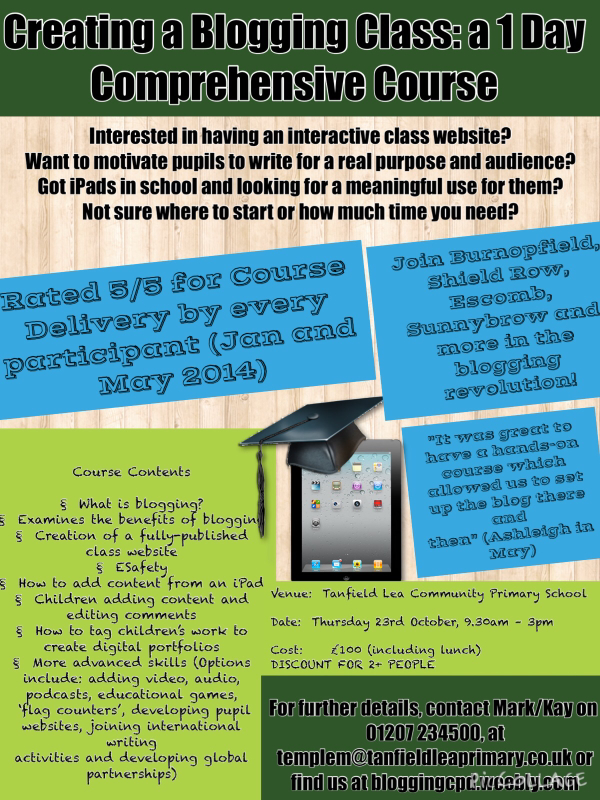
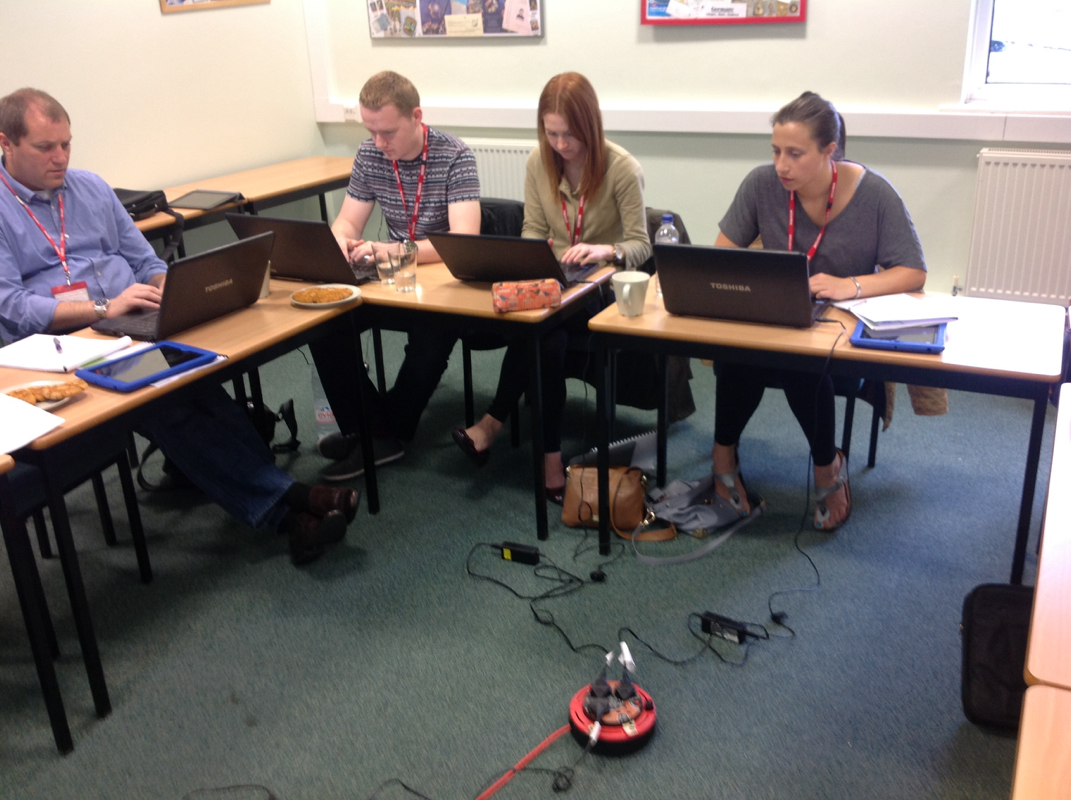
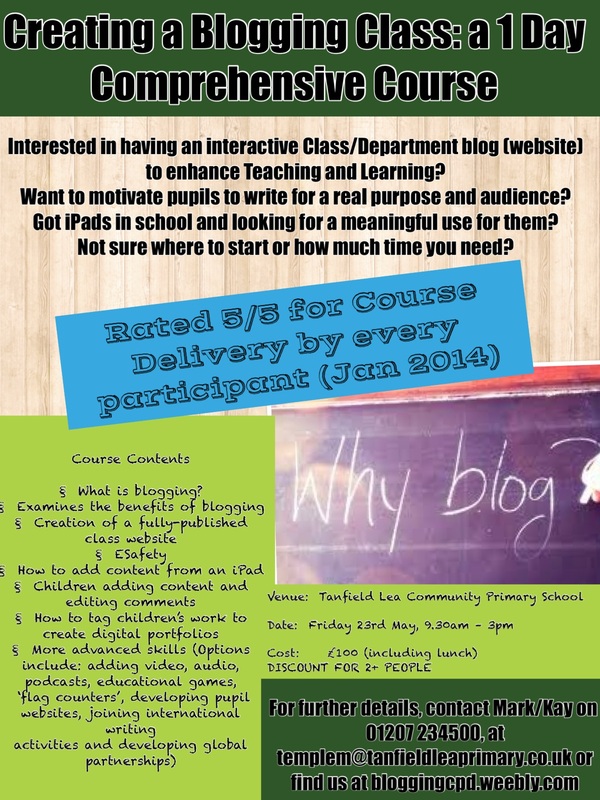
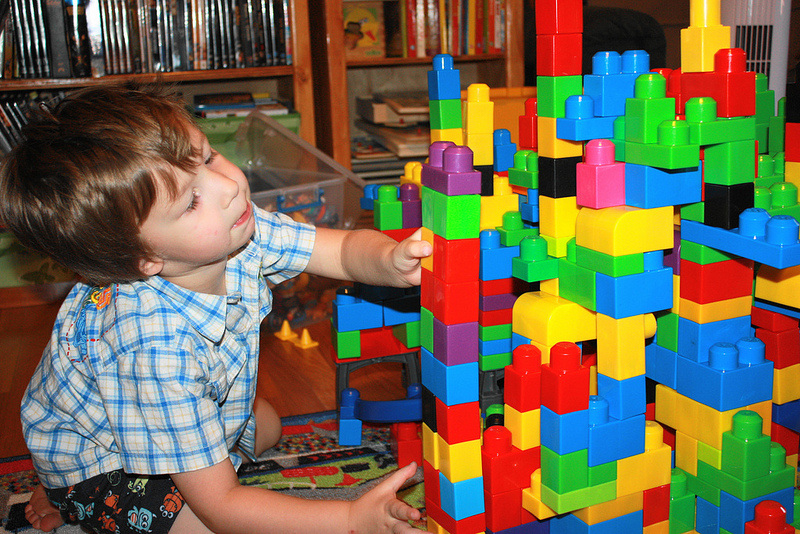
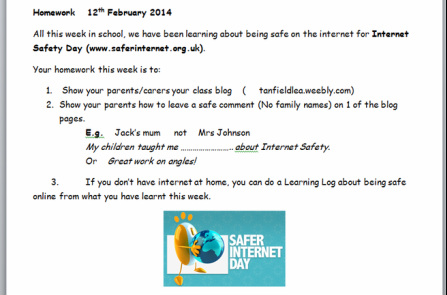
 RSS Feed
RSS Feed